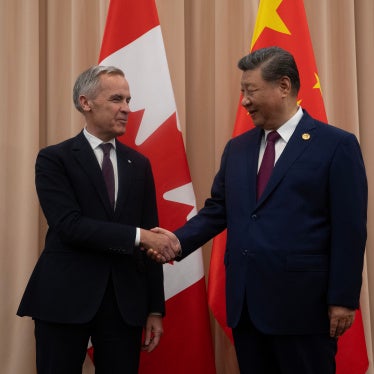(New York) – The Philippine government should disable abusive paramilitary forces and take concrete steps to hold those responsible for killings and other rights violations to account, Human Rights Watch said today in its World Report 2012.
The administration of President Benigno Aquino III has not fulfilled its promises of reform and made little progress in ending impunity for abuses by state security forces, Human Rights Watch said. Extrajudicial killings and torture of leftist activists, alleged communist rebels, and accused criminals continue, but the government has failed to acknowledge and address involvement in these crimes by the security forces and local officials.
“After a year and a half in office, President Aquino should be delivering on his promise to end impunity for rights abuses,” said Elaine Pearson, deputy Asia director at Human Rights Watch. “His administration will ultimately be measured by what it achieves, not by his stated intentions.”
In its 676-page report, Human Rights Watch assessed progress on human rights during the past year in more than 90 countries, including popular uprisings in the Arab world that few would have imagined. Given the violent forces resisting the “Arab Spring,” the international community has an important role to play in assisting the birth of rights-respecting democracies in the region, Human Rights Watch said in the report.
In December, after the report went to print, a court in Bulacan province issued an arrest warrant against retired army Maj. Gen. Jovito Palparan and other officers and soldiers for the enforced disappearance of two student activists in 2006. Palparan is the highest-ranking military officer to be charged for human rights abuses since the ouster of dictator Ferdinand Marcos in 1986. He is implicated in the abduction, torture, and killing of dozens of leftist activists in the Philippines.
The Justice Department has put up a one million peso (US$23,000) bounty for information leading to the capture of Palparan, who is in hiding. While the Justice and Interior departments have formed a “tracker team” to hunt down the fugitive general, Aquino should order the police and military to do more to arrest him, Human Rights Watch said.
Despite this unprecedented development, unlawful killings continue and the government should do more to hold those responsible to account, Human Rights Watch said. Human Rights Watch has documented at least seven extrajudicial killings and three enforced disappearances for which there is strong evidence of military involvement since Aquino took office in June 2010.
Hundreds of leftist politicians and political activists, journalists, and outspoken clergy have been killed or abducted since 2001, Human Rights Watch said. The government has largely failed to prosecute military personnel implicated in such killings, even though strong evidence exists in many cases. Only seven cases of extrajudicial killings from the past decade have been successfully prosecuted, none of which were in 2011, or involved active duty military personnel. Even in the Palparan case, it was the victims’ family – not the government – who initiated the criminal case.
The police and military were implicated in numerous incidents of torture in 2011. While several investigations are ongoing, the rigor of investigations varies and no one has been convicted under the 2009 Anti-Torture Act. In July, soldiers allegedly stripped naked, sexually assaulted, and set on fire a 39-year-old baker, Abdul-Khan Balinting Ajid, in Basilan. While the military says several soldiers involved have been restricted to barracks in Manila, no criminal charges have been filed.
“The arrest and prosecution of Palparan would be the most significant move against impunity for military abuses in the last decade,” Pearson said. “But the government should be more proactive in investigating killings and torture, arresting suspects, and vigorously prosecuting them.”
Aquino has defended the use of poorly trained and abusive paramilitary forces to fight communist insurgents and Islamist armed groups in 2011, Human Rights Watch said. Despite campaign promises to dismantle “private armies” of politicians and wealthy landowners, which have long been responsible for serious abuses, Aquino has not revoked Executive Order 546, which local officials cite to justify arming their personal forces. In October, Aquino announced the deployment of additional paramilitary personnel to provide security to mining companies.
Members of the powerful Ampatuan clan, military, police, and paramilitary personnel, among other suspects, are on trial for the massacre of 58 people, including more than 30 journalists, in Maguindanao province on the southern island of Mindanao, in November 2009. Two years later, the trial is ongoing, albeit snail-paced, with witnesses for the prosecution, including families of the victims, testifying.
In addition to abuses by government forces, the communist New People’s Army (NPA) has unlawfully killed and detained civilians and extorted “taxes” from individuals and businesses, Human Rights Watch said. NPA leaders have often sought to justify targeted killings by asserting that those killed had earlier been condemned by NPA-organized “people’s courts” for “crimes against the people.” Then-UN special rapporteur on extrajudicial executions, Philip Alston, concluded that the NPA’s court system “is either deeply flawed or simply a sham.”
In 2011, the Philippine army fabricated stories that several children taken into military custody were NPA rebels. In several cases investigated by Human Rights Watch, the army paraded the children in front of the media, publicly branding them rebels despite conclusive contrary evidence. In two of the cases, the army detained the children for several days.
“It beggars belief why two years after the Maguindanao massacre, Aquino still has not dismantled the country’s paramilitary forces,” Pearson said. “Both government forces and armed rebels should ensure compliance with the laws of war and protect ordinary civilians, who bear the brunt of the conflict.”







